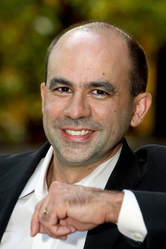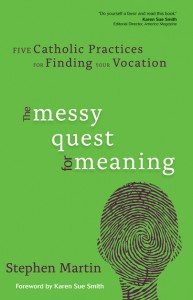 A debilitating anxiety disorder brought on by a rejection of God during his teenage years led Stephen Martin through some rough times as a young adult. In retrospect, however, he sees his problems as a blessing because they forced him to confront his personal issues, his sense of meaninglessness, and his relationship with God.
A debilitating anxiety disorder brought on by a rejection of God during his teenage years led Stephen Martin through some rough times as a young adult. In retrospect, however, he sees his problems as a blessing because they forced him to confront his personal issues, his sense of meaninglessness, and his relationship with God.
In his new book “The Messy Quest for Meaning: Five Catholic Practices for Finding Your Vocation,” Stephen shares his personal story along with the insights and revelations that led him to a healthier, more well-rounded life today.
Stephen grew up in a large, devout Catholic family, but like a lot of young people, he never thought about what his faith meant to him and why he believed what he did. After reading books during his high school years by famous writers who opposed religion – Nietzsche, Marx, Camus – Stephen followed their logic and began to doubt everything he’d been taught about God.
As he explained to me on Christopher Closeup, “[They] really challenged me to think about, ‘Why are there so many problems in the world? Why isn’t more being done to solve them? How could a good God allow these things to exist?’”
It wasn’t until Stephen lost his faith that he realized he also lost his sense of meaning and purpose and order in the world: “When I forfeited that – actually just voluntarily walked away from it – I saw how important it is to have a spiritual compass in your life. Because from the end of high school all through college, I was very directionless.”
The seeds of a renewed faith got planted in Stephen when he was having a conversation with his uncle, who was a priest. Stephen – who was attending Duke University at the time – lamented the fact that his fellow student, all star basketball player Bobby Hurley, seemed to get all the breaks and talent in life. In comparing himself to Hurley, he felt jealous, like he didn’t measure up and never would.
Stephen’s uncle told him that God distributes different talents to everyone. Instead of worrying about what talents he didn’t have, he should look harder for the ones he did have and how to use them. That wisdom was lost on Stephen at the time, but stayed with him as he matured.
Part of that maturity can be attributed to Stephen’s college professor, Wallace Fowlie, who taught him that “faith and learning could intersect at a very high plane.” Once he came to see that there was a great intellectual tradition in Catholicism, he became open to faith once again.
Another step forward came when Stephen visited the Trappist monastery, Mepkin Abbey in South Carolina. He said, “I’d been a fan of Thomas Merton for several years, even when I wasn’t attending church, and had always wanted to go to a monastery. I was blown away by how mindful the monks were, how purposeful their lives were, how committed they were to a schedule, and how they were such a counter-cultural group of people. When you’re coming out of college, you’re thinking about careers, making money, trying to attain status and cement yourself in the world. And then here you have this group of men who really are doing the exact opposite. They’re not pursuing status or money or success by any kind of conventional standard—and they seem completely happy in doing it.”
Though Stephen’s faith life improved, it still hadn’t matured into an adult faith. As a result, he developed a severe anxiety disorder, which ironically came to a head during his time working for a newspaper in Mount Airy, North Carolina – Andy Griffith’s real-life hometown on which the peaceful idyllic town of Mayberry was based in “The Andy Griffith Show.”
Stephen explained, “The people who lived there are, as in the TV show, wonderful, wonderful people. But when I moved there right after I turned 26, [I had] some bad habits that I had developed: not exercising, my diet was terrible, I wasn’t very good at communicating what I thought about things, and didn’t get along with my boss very well either. This all culminated in a severe anxiety disorder. It was paralyzing for a lot of that year…Anybody who’s ever had an anxiety disorder or struggled with a mental illness would be able to relate.”
Despite the pain, Stephen now sees that time in his life as a blessing. He says, “The anxiety forced me to slow down, look hard at my life and figure out better ways to live. I came to see the anxiety as a friend. I thought of it for a long time as an enemy – and as long as I struggled against it, I wasn’t making a lot of progress. And one day I suddenly realized, ‘The anxiety is trying to tell you something; you’ve gotta change how you’re living.’…I think it can be God getting your attention. There’s a great book that Walter Ciszek, the late Jesuit, wrote called “He Leadeth Me.” He talks a lot about how God has to figure out how to break through the clutter and distraction of your daily life, and sometimes He’s gonna do it in dramatic ways. And I think sometimes these illnesses or other difficulties that we encounter in life, could be Him speaking to us. We need to listen – as difficult as that can be – and figure out how to turn a hard time into an opportunity to grow in faith.”
 That revelation led to Stephen living a physically and spiritually healthier lifestyle. He started going to church regularly with his girlfriend (and now wife) Dawn, making time for daily prayer including the Examen, and pursuing “the messy quest for meaning” in his life inspired by five Catholic practices he’d learned on his winding faith journey. Through a detailed exploration of these practices in his book, he now hopes others can learn from the road he’s traveled.
That revelation led to Stephen living a physically and spiritually healthier lifestyle. He started going to church regularly with his girlfriend (and now wife) Dawn, making time for daily prayer including the Examen, and pursuing “the messy quest for meaning” in his life inspired by five Catholic practices he’d learned on his winding faith journey. Through a detailed exploration of these practices in his book, he now hopes others can learn from the road he’s traveled.
Stephen summed up these practices briefly during our interview: “Figure out what your strengths are, what your passions are. Then you need the focus and the structure to take those passions and channel them. You need humility to know what your strengths and weaknesses are. You need a sense of community, so you’ve got other people helping you understand what your strengths and weaknesses are…There’s a fifth practice I call margins. This is about taking a leap in some area of your life, really stretching yourself. I think when you get all five of these things working, it creates a virtuous cycle…where you discover new things about yourself and maybe new desires.”
Now, the man who once felt he had no vocation believes he has multiple ones. Stephen, a husband and father of two children, explains, “This is a very exciting realization for me. I spent my entire twenties thinking I’ve got to find the exact one thing that I’m here for, and I equated that with finding the perfect career. And only in the past five or six years did it occur to me that not only can we have more than one calling, it’s actually healthier because we don’t risk burning ourselves out on one particular thing. So to take my own life as an example, I have a calling, first of all, as a Catholic, second as a family man, third as a public relations professional and speech writer, and fourth as an author. I find that being able to move around these different parts, being able to go home and spend time with my family, go spend time in our church community, it keeps me refreshed and renewed and excited about each of these different areas. It keeps you in a positive frame of mind and so I would encourage people: don’t just stop at one calling! Think about all the different areas of your life that you can keep developing. It makes your life so much richer.”
To listen to my complete interview with Stephen Martin, click the podcast link:
Christopher Closeup Podcast – Guest: Stephen Martin











